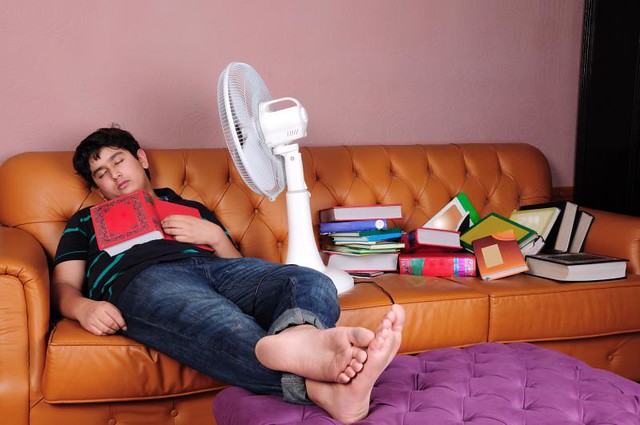The impact of insufficient sleep is drastically harmful. Teenagers are already emotionally volatile; sleep deprivation and mood disorders are solidly linked. A 2013 study indicated that sleep is vital when it comes to properly utilizing language, which is necessary for scholastic endeavors as well as everyday communication.

// Muhammad Rehan //
Another study, which focused on some 300+ South Australian teenagers, showed that both kids and parents vastly underestimate the incidence and severity of sleep problems among adolescents. It's no secret that high schoolers have bad bedtime habits. However, researchers found that a shockingly high proportion of students fulfilled clinical criteria for sleep problems: 66%. Yikes.
The researchers commented that, "if many parents are unaware that their adolescent has a sleep problem, there is a risk [that] these adolescents will not gain access to treatment." Later they continued, "Parents [may be] unaware of what constitutes 'good' sleep in adolescents [and they are] unlikely to modify family, homework, or sleep schedules if they do not believe that there is a problem with their teens' sleep."
Part of the issue is clearly simple ignorance, compounded by the difficulty of accessing concrete information about adolescent sleep problems. Even those who are actively seeking resources may have to dig around and read closely to find actionable knowledge. For instance, I just Googled "clinical sleeping problems criteria adolescents", and the most helpful results were incomprehensible pages from US National Library of Medicine, BehaveNet, and Harvard Health Care Policy. Those articles may be useful to psychiatrists, but not to laypeople.
Resources for adults with sleeping issues are relatively abundant: here is a quick checklist from IU Health and a more in-depth one from Sleep Disorders Guide. Parents can use such lists to evaluate their own nighttime schedules. But it's hard to extrapolate the principles to youthful family members, because sleep needs are determined based on physio-cognitive development.
A 2012 study illustrated that sleep deprivation can significantly degrade adolescent memory. Teenagers' bodies and minds are literally expanding, meaning that their rest requirements exceed those of adults. Okay, that's common knowledge. But where's the checklist of specifics for puberty-age kids? Has this demographic been abandoned due to its notorious variability? Despite the efforts of Stanford’s Center for Sleep Sciences and Medicine, the parents of adolescents are left in the dark--without even a nightlight.
The medical community needs to emphasize the importance of sleep to parents and teachers; high school health curricula should stress the need for sleep. As a teenager, I remember being told to go to bed early before exams instead of staying up late to study, but nobody told me why, and I had no rubric for judging whether my personal sleep habits were appropriate. Today, many high schoolers are in the same boat.
Maybe it's time for a nap.

As someone who has struggled my whole life with sleep I ~nods, nods, nods~
ReplyDeleteThe last month solid I've been up into the early hours every night and crashing on weekends. It's a very old habit. I shouldn't do this because I'm on meds that knock me out, but I've been fighting right though them. I have no idea why. When I see I'm up past 1am and I know I have to be up super early for work I'm like, ugh, why did I stay up? What did I do with my time? Nothing. Nothing productive. Don't mind me, I'm neurotic.
I can relate. Would it be obnoxious to wish you sweet dreams?
DeleteThank You and that i have a super offer you: Whole House Reno home renovation near me
ReplyDelete